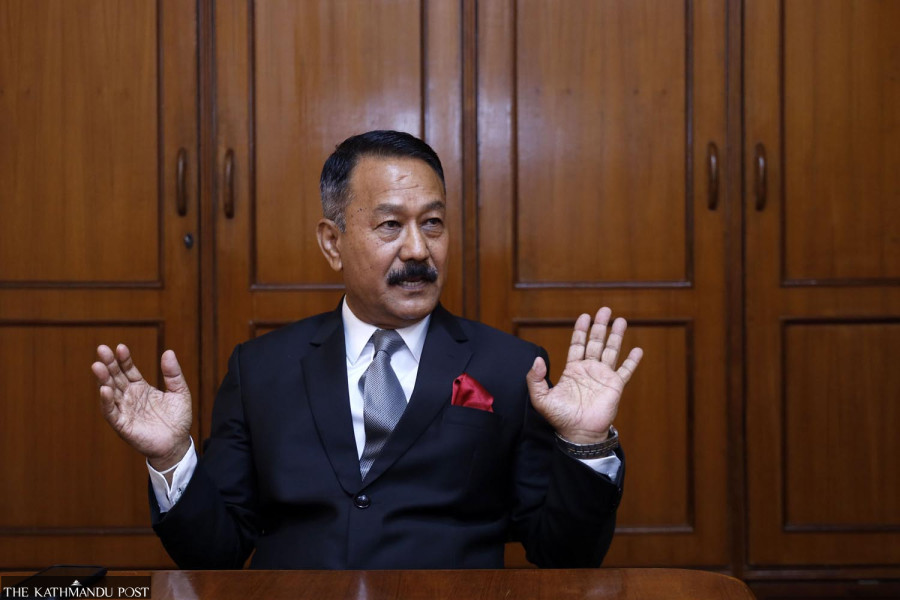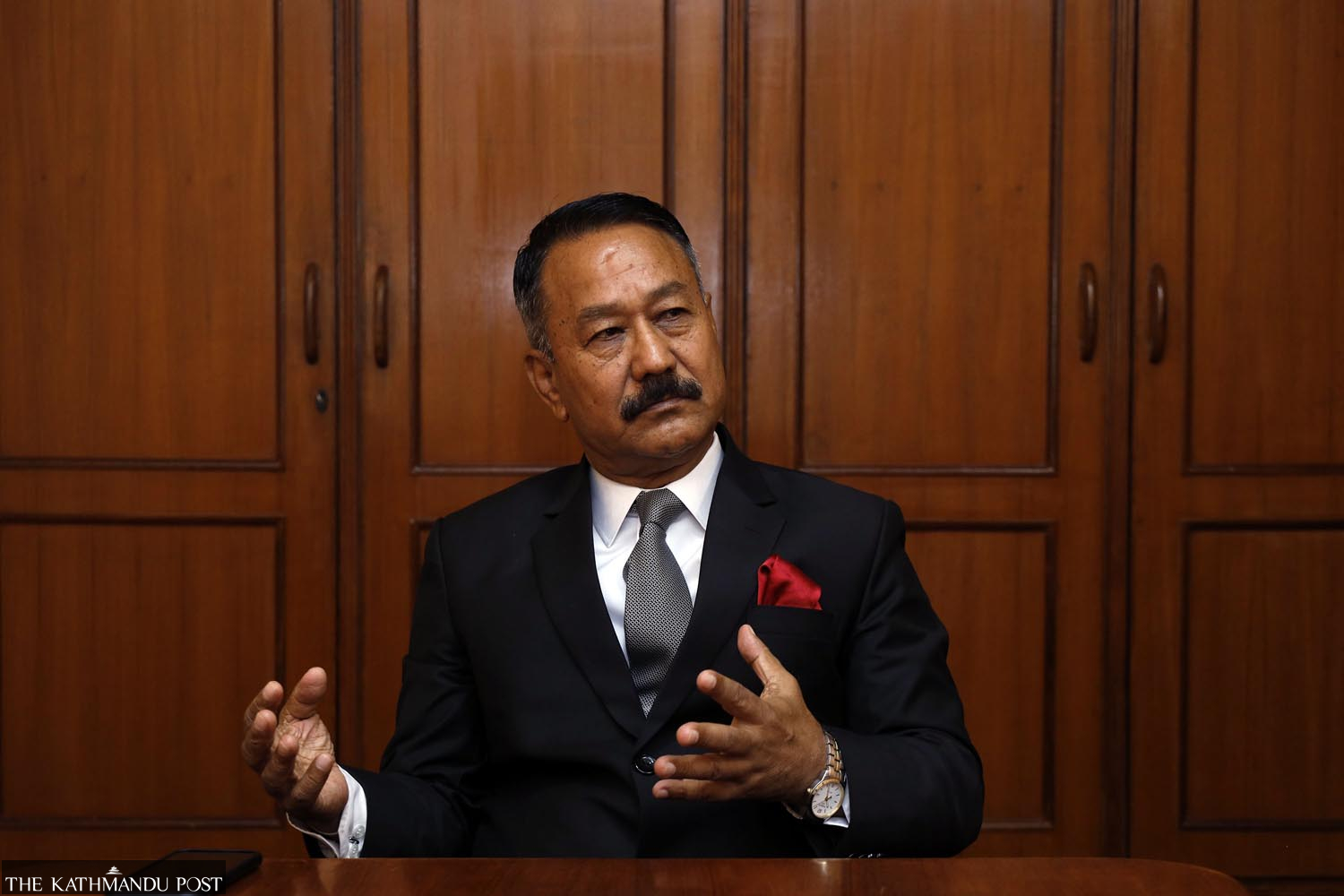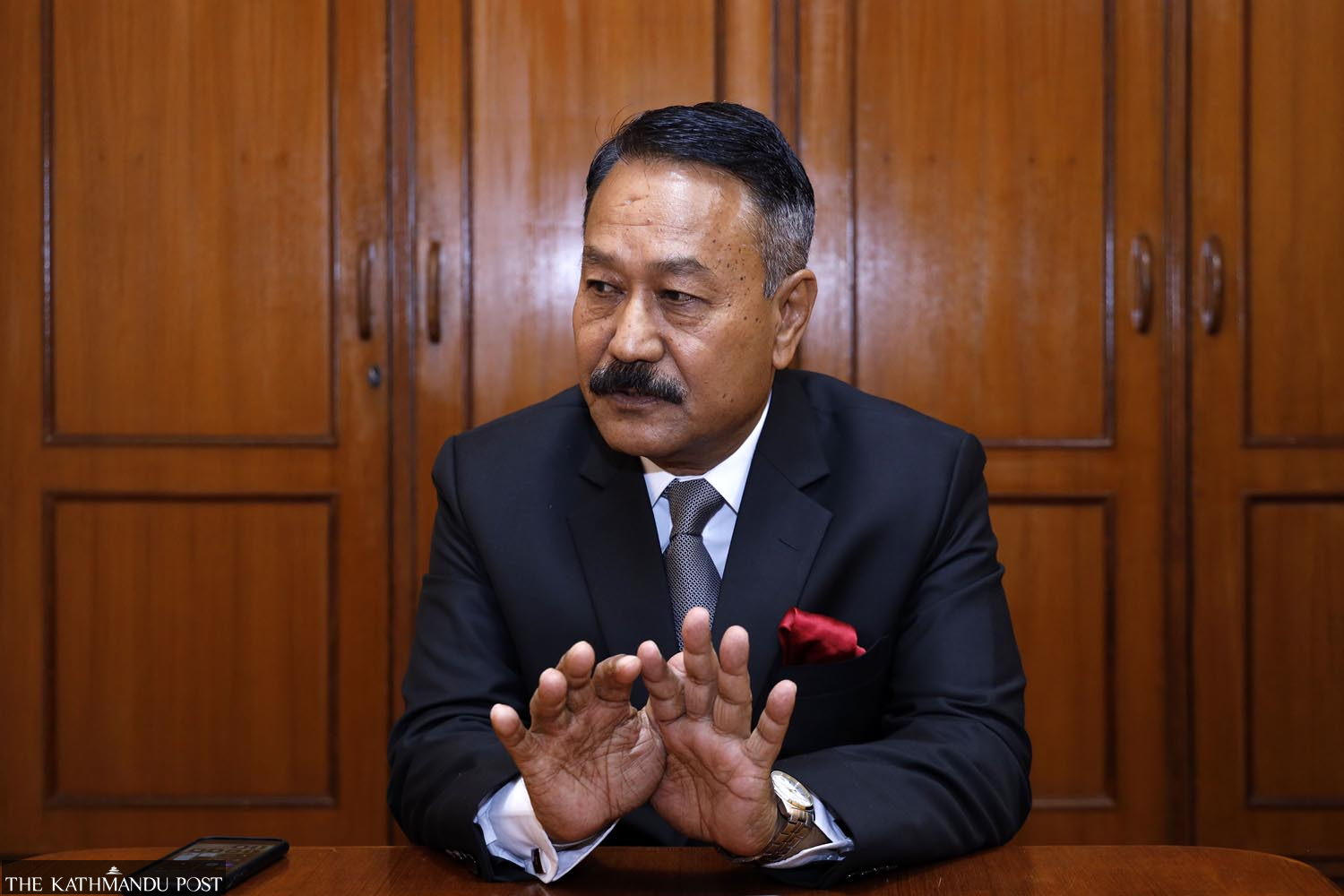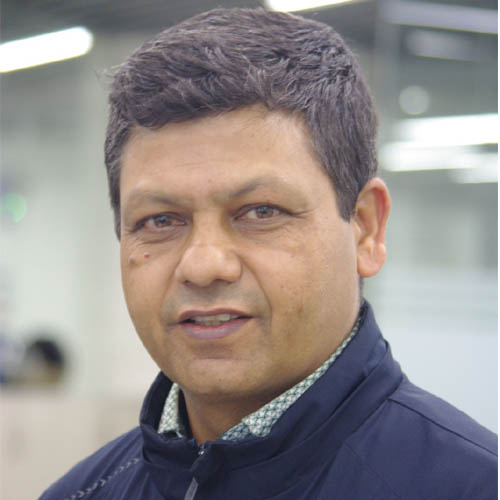Interviews
First, directly elect chief ministers and then do so for executive head at centre
We have to think about transferring certain rights from local to provincial level because local units don’t have expertise to oversee all tasks they are entrusted with.
Thira Lal Bhusal & Binod Ghimire
Nepal is marking its ninth Constitution Day on Thursday. The country’s two largest parties—the Nepali Congress and the CPN-UML—formed a coalition government a month ago with a commitment to reviewing and amending the constitution. In this context, Post’s Thira Lal Bhusal and Binod Ghimire sat down with constitutional expert Purna Man Shakya to discuss the good and bad aspects of the constitution amendment process.
The Congress and the UML have floated a proposal to amend the constitution. Is the time ripe to make changes in our statute?
Generally, constitutions are reviewed after around a decade of their implementation. So, we have come to the stage of reviewing whether our constitution has functioned properly. However, the sudden announcement of the amendment is premature, as this is a serious business. In our case, the constitution can’t be amended just based on the interest of one or two parties. It requires a national consensus. There should be an understanding among the political parties represented in Parliament. And, a sort of consensus even among the people’s level is important as there was huge public involvement in making this constitution. Sentiment of various communities must be respected while making any changes in the national charter.
What can be the modality of seeking consensus at the people’s level? Should a draft be prepared and opened up for debate?
While making changes in the constitution, some issues might be technical and not of interest to common people. But if any changes are made in policy issues that can alter our country’s structural dynamics, the concerned communities must be consulted. Just the present strength of the political parties represented in Parliament is no guarantee that they truly represent people. For instance, the Maoists emerged as the largest party through the election in 2008. But it has been shrunk to a distant third in the House. However, we can’t conclude from this that the people have discarded the party’s agenda. The Maoists might have been discredited due to their activities and failure in delivery but people might still favour the agenda they once championed. Similar is the case with other parties. Therefore, we have to consider broader consensus both in Parliament as well as the people’s level.
How challenging is it to enter the constitution amendment process?
Any amendment calls for a two-thirds majority in the House of Representatives as well as the National Assembly in the federal parliament. If an issue is linked to provincial authority, it should be endorsed by the majority [four] of seven provinces. So, this is not easy. Therefore, the parties should tread carefully.
You mentioned earlier that constitution amendments without a review process is not a right step. Could you elaborate?
The right way is to first have broad understanding among the top leaders of political forces on the issues and then constitute a panel of experts to conduct a comprehensive study on that. Such studies are conducted through two methods—doctrinal and non-doctrinal. The doctrinal method analyses related literature and principles on theoretical approach while the non-doctrinal method studies the public sentiments and opinions through surveys and interactions, and comes up with certain methodologies with the help of subject experts. Through such study, the experts identify the issues and recommend the ways to the politicians. This is the right process.
There are also arguments that reviewing the constitution without even bringing it into full-fledged implementation is wrong.
Based on the practice during these years, we have concluded that certain provisions didn’t work properly. It is true that we are talking about making changes in the constitution without even implementing certain provisions. First we have to give the system an opportunity to work in a full-fledged way. Then, we can evaluate whether it worked. Any move to dissolve the system without properly implementing it will create divisions and invite another conflict.
A question that is often asked: Is there a problem with our constitution or with our politicians?
People can change the constitution but the constitution can’t change the people. Therefore, a constitution should be developed also on the basis of the nature of people in the country who use it. If our political parties and the politicians had reformed themselves, we might not have had to discuss constitutional changes time and again. We should have made the system strong for more effective checks and balances and made leaders and officials more accountable.

The ruling parties reason that the constitution amendment became necessary to ensure political stability.
When a federal government is changed, its aftershocks are immediately seen in all seven provincial governments. It directly impacts development and other activities across the country. It’s a flaw in our party system but we have to find a solution in the system. We see people raising voices for two things—stability and retirement of old politicians. As Nepali politicians never retire voluntarily, we have to address it through the system. Direct election of executive head can be one way to address this problem. People have found local governments more effective than federal and provincial governments. It is because chiefs and representatives of local governments are directly elected and they can serve the full five-year term.
Once people are given the right to elect heads of government, they won’t elect old faces such as KP Oli, Sher Bahadur Deuba and Prachanda [Pushpa Kamal Dahal], who have been tested multiple times. It will serve two purposes—first, it gives stability and second, it allows popular leaders to emerge in place of the old ones. The old leaders have maintained control over national politics through their huge party organisations. But when people directly elect presidents and chief ministers their grip over party organisations can’t be decisive in national politics. For that we have to amend the constitution.
However, again, an expert team needs to thoroughly study the pros and cons of such changes. But what I can say based on the general study of public perception is that we can first go for direct election of executive heads at the provincial level. In the next phase we can go for direct presidential election at the federal level.
What went wrong in the practice of the three-tier federal system?
While adopting federalism, the basic idea was to allow the local governments to oversee local matters while the provincial governments would handle wide ranges of issues related to agriculture, industry, forest, education and health, etcetera. If the two sub-national governments handle these things, people don’t need to come to the centre seeking solutions to their problems. In such a scenario, the federal government can focus on important affairs such as foreign relations, defence, telecommunication, currency, national infrastructure projects and inter-provincial affairs. Such division of powers would automatically create specialisation in the respective governments.
But the federal system is not implemented as per that spirit. Provinces aren’t allowed to exercise their rights. People are still travelling to Kathmandu all the way from remote districts even for basic things. The constitution has mandated the provinces to maintain law and order in their respective provinces but the federal government hasn’t allowed them to have their own police forces. Provinces without police have become like administrative units. The centre has a huge bureaucracy in Kathmandu. It is high time that the centre delegates authority to provinces as per the constitutional spirit. Federal lawmakers have huge interest in local development activities because it is directly related to their election. They don’t want to lose this influence. The interest of federal lawmakers however contradicts with the constitution.
There is also a belief that the local level has authority in areas where they can’t work effectively, for instance they are mandated to oversee the education system up to grade 12 while provinces don’t have much role. Do you think such jurisdictional matters need to be reviewed and provinces should be given more authority?
That’s right. First of all, we should be clear that there is no point in adopting a federal system if we don’t want provinces because we had central and local levels even in the past. Provincial layer is an integral part of federalism. So, we have to think about transferring certain rights from local to provincial level because the local units don’t have expertise to oversee education up to grade 12 on their own. Our local units are traditionally trained in local development activities. But now they are entrusted with the responsibility of not only overseeing education and health issues but also with legislative and judicial functions. They haven’t been able to play that role. We should think about transferring some roles from local to provincial levels. Likewise, the centre should be ready to allow the provinces to exercise their rights bestowed by the constitution. It is time to strengthen the provinces.
You said direct election of executive heads in provinces could end instability at the provincial level. But what if a popular leader got elected chief minister but other political parties won majority seats in the provincial assemblies? In such a situation, the rival parties may not help the chief minister pass a budget or policies from the assembly.
Yes, there are strengths and weaknesses of all systems. Such problems can be resolved because we see similar situations in other countries as well. Parties can’t prolong the deadlock in the House because they will be blamed for the impasse. One basis is that our local units are doing well under executive heads. So, we can practise it for a decade in the provinces and then apply it to the federal level based on that experience.
Many forces and groups that aren’t happy with the present constitution, which was basically a compromise document. Once the constitution amendment process is open, they are certain to revive their demands. Will the situation be manageable?
If the rights of historically marginalised communities are curtailed, they will certainly retaliate. If you try to go against the federal republic system and policy of inclusion, it may invite new conflicts. The proportional representation system is not a problem. Leaders made it unpopular by misusing it. We should find solutions to stop its misuse. We shouldn’t forget that this constitution is not only a constitution but also a key document of our peace process. This is not perfect but it was essential to end the conflict.

Many say that while making a document of compromise, our constitution hasn’t followed the principles of constitutionalism. For instance, the hearing system is something unusual in a parliamentary system. As a constitutional expert, do you think we should also think about fixing such deviations?
You are right. When we couldn’t change the people, we tried to add additional features as a measure to check the wrongdoings. Our leaders make appointments in key constitutional bodies guided by their personal and partisan interests. We copied the hearing practice from the presidential system with a view to check the leaders’ arbitrary appointments. It hasn’t been that effective. Therefore, we have proposed to give continuity to the hearing for political appointments but not in the appointments of judges because lawmakers don’t have the expertise to examine judges’ competence. Since lawmakers are mainly guided by the party’s whip and top leaders’ instructions, it rather increases political interference even in the judiciary. We have thus proposed to stop the hearing process for judges’ appointments.
Many say that the judiciary hasn’t been federalized even though all other sectors have been restructured as per the three-tier federal system. Why this exception for the judiciary?
Oh, you dragged me to a sensitive topic. One thing we shouldn’t forget is that we adopted a federal system not to unify small countries. We were already a united country. We adopted it to better manage our social diversity by involving all the communities in the governing system. We at the same time have to safeguard the country from disintegration. Judiciary, the national army and Nepali language are our institutional arrangements that can play a unifying role. Therefore, we didn’t make much changes in these three aspects.
Some instances show that Nepal’s federalism might have been a bit more effective had the judiciary worked proactively. For instance, the court hasn’t decided even the cases filed by provinces years ago. What do you think about the judiciary’s role in this connection?
Yes, those cases are still undecided. In the Constituent Assembly, the Maoist party had registered a proposal to form a separate constitutional court. The justices who were leading the judiciary at the time opposed the idea. It was later rejected. Then the idea to have a separate constitutional bench was included as a compromise deal. But it has failed to work effectively. It failed to decide election-related disputes. We have to review its jurisdiction. They have decided certain cases when there is public pressure. For instance they decided cases like House dissolution because there was constant public scrutiny. But they haven’t shown any interest in other important cases where constitutional interpretation is needed. Of late, a strong opinion is being built in favour of forming a separate constitutional court. These issues are being discussed seriously. This issue may emerge if the constitution amendment process begins.
What we can infer from your analysis is that the constitution amendment process is not that easy. What are the basic things that should be and can be done in the constitution amendment at this stage?
First, we should change the form of governance at the provincial level and go for a directly elected executive head. With this there will be no change in government in provinces after changes at the centre. The governments in provinces can work for five years with certainty. Second, we can transfer the powers that the local units have failed to exercise to provinces. And, the centre should allow the provinces to exercise the concurrent rights. By doing this the centre can reduce the overwhelming burden on it. While the provinces can play an implementing role, the federation can play a supervisory role. These things need to be fixed. We need some amendments to the constitution and some new laws for this.




 13.12°C Kathmandu
13.12°C Kathmandu













